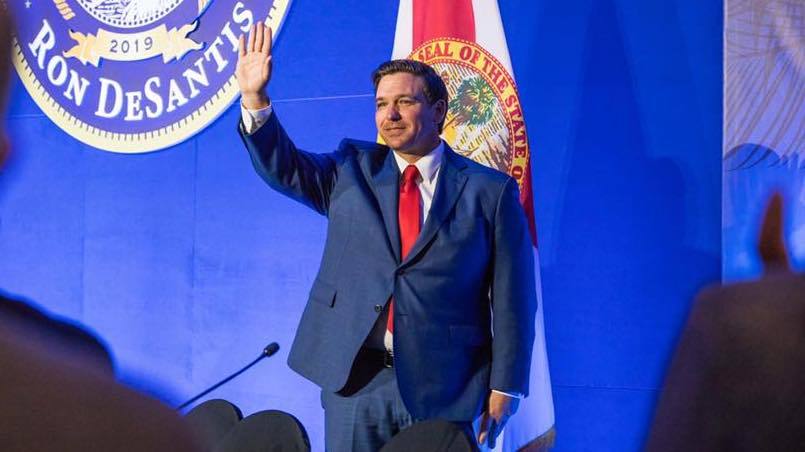According to Florida Chamber of Commerce President and CEO Mark Wilson, the Sunshine State is emerging strong out of the pandemic.
After Gov. Ron DeSantis opted Florida out of the $300 federal increase in unemployment benefits last month, Wilson only sees the economic outlook improving for Florida's employers.
"I've said for a decade that Florida is the best place in the world for people who want to work," Wilson told Florida Business Daily. "By eliminating the no-work incentive, we're helping people get back to work but we're also helping local businesses have the talent they need to keep going."
While federal unemployment funds assisted Floridians when the nation first began shutting down in response to the COVID-19 pandemic, Florida has more jobs looking for people than people looking for jobs, so incentives to get back to work will benefit the state, Wilson said.
Without income assistance from the federal government, Florida's businesses are hopeful that more people seeking work will knock on their doors.
Anna Maria Oyster Bar owner John Horne said that each of his four locations in Manatee County was short-staffed by at least 10 people since the federal unemployment assistance began. He remarked that the restaurants hadn’t seen a single application “in two months” despite using Indeed, Facebook and Craigslist to advertise open positions.
Horne told Fox13 that within the first week since the federal unemployment aid ceased, the restaurants “have seen an uptick in applicants."
Wilson commented that other factors contributed to a labor shortage in Florida before the pandemic, however, including businesses flocking to the state in response to its pro-business policy record, a substantial portion of the population being elderly and retired and a state unemployment rate half that of the nation.
"We have 454,000 fewer jobs in Florida today than we had pre-COVID," Wilson said. "We need to add those jobs back, and on top of that, we need to add another 1.5 million new jobs in Florida by 2030."
Job Loss by Category: February 2020 to May 2021
Courtesy of the Florida Chamber of Commerce
| Industry | Job Change | Percent of Industry |
| Total—All Industries | -454,400 | -5.0% |
| Leisure and hospitality | -258,300 | -20.2% |
| Trade, transportation and utilities | -49,800 | -2.7% |
| Education and health services | -44,300 | -3.2% |
| Professional and business services | -11,600 | -0.8% |
| Manufacturing | -8,800 | -2.3% |
| Information | -7,500 | -5.4% |
| Construction | -2,900 | -0.5% |
| Financial activities | +4,000 | +0.1% |
Can the business policies that made Florida successful before and propped up the state during the pandemic help it downshift out of the public health crisis? Wilson points to the state's economic fundamentals that helped Florida generate one out of every 11 new U.S. jobs from 2015 to 2020.
"We had momentum," Wilson said. "We had a really good set of policies in Florida that were helping to diversify our economy and to create high-wage jobs."
It was those five to six years of economic diversification that kept Florida afloat as pandemic shutdowns swept the U.S., Wilson explained, in addition to DeSantis' persistence in keeping the state as open as possible.
"We had a head of steam going into COVID, and then never actually shut down. Florida had a big advantage over almost every other state in country because of our policies," Wilson said. "We may have been at a slow job growth, but at least we weren't like the other states that literally shut down. Our economy was already moving forward while others were staying still."
Specifically, Wilson applauds Florida for allowing restaurants to serve carry-out alcohol, instilling legal protections over businesses against lawsuits for COVID-related matters and delaying several tax deadlines and licensing requirements for various industries and businesses. He also attributes the state's economic success to the state and local chambers staying closely connected throughout the crisis. More than 150 local chambers participated in weekly calls with the state chamber during the pandemic.
"Florida found balance in keeping the economy going while protecting our most vulnerable citizens," Wilson said. "I've a lot of credit for our governor for the policy choice to keep the economy open while at the same time protecting four-and-a-half million seniors."
The biggest contributor to Florida's success, according to Wilson, was not a policy but a mindset.
"We knew that we had to keep businesses open and keep Florida safe," he said. "In a lot of states, they fell into the false belief that the only way to keep people safe was to shut down all businesses. That is an important decision that our governor made."
With the Sunshine State welcoming an average of 900 people across its borders daily and businesses relocating to the southeastern state for its pro-economic policies, Wilson said his economic outlook for Florida is "very positive."
"People all over the country want to know what the advantages of doing business in Florida are," he said. "We don't have income tax, we have good weather, but a lot of people don't know that we have the number-one rated college and university system in the U.S., and we are top five for education."
According to Wilson, almost $2 million worth of income is generated in Florida every hour. The state is in the top five for best business and tax climates as e-commerce explodes and the Panama Canal expands.
"With our trade and logistics initiative, Florida is poised to make a lot more, add more jobs and have a quality of life that is second to none," Wilson said. "The rest of the country wants to be like Florida. If Florida was a stock, I would be buying it all up right now."

